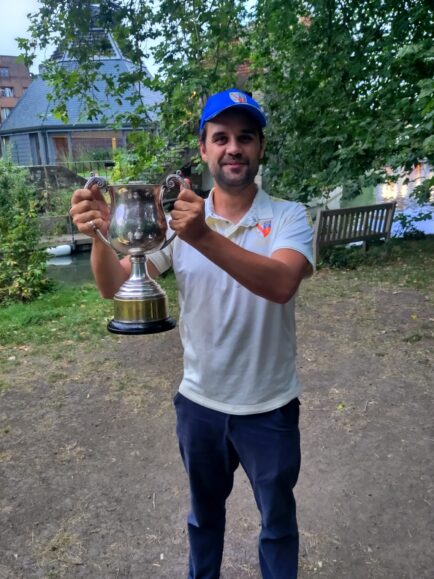
If there are two things that resident doctors are used to, it’s lack of sleep and being told what to do. So it comes as a surprise that James Bevan found these factors the dealbreaker in his incipient career as a Darwin rower.
“I couldn’t deal with the early mornings and the cold, cold hands, and someone shouting at me to row faster. So I didn’t do that for very long.”
Instead, he joined the College Cricket Club, helping the team to victory in the MCR Cup despite “not having played cricket in years”, played hockey for the University and attended the May Ball, ticking off enough Cambridge experiences to scratch a lifelong itch.
“I had always wanted to go to Oxbridge, and thought I’d lost the chance. So then when I got the opportunity, I really wanted to embrace it.”
Taking opportunities when they present themselves has been a feature of an impressively diverse early career. While working towards an undergraduate degree in Chemistry at Bath University, James took a year out to work in sustainability consultancy, a field which, after a brief dalliance with accountancy, he then worked in for several years post-graduation, before changing direction to train as a doctor.
“I felt at the time that no one was taking sustainability seriously. I felt it was a real uphill battle, and I wanted to be working on what I thought was the front line of the climate crisis. But this is all me making sense of it now. Back then it was probably like a quarter-life crisis. I applied to medicine kind of thinking I wouldn’t get in – and got in!”
However strategic the decision, James completed a graduate entry medical degree at Southampton University, where, after a few years of clinical work, he is now a part-time Senior Teaching Fellow teaching Planetary Health.
“My research to date has focused on climate, health and infectious disease,” he explains.
“Planetary Health is the concept or science that acknowledges that human health is completely dependent on the health of the planet’s living and non-living systems. My job at Southampton is to educate future doctors on the health risks that are arising as a result of climate change, biodiversity loss and pollution. While also providing them with the skills to practice more sustainably and be advocates for change.”
Alongside this role, James is pursuing the NHS Public Health Registrar training programme, which includes a fully funded one-year Masters, which brought him to Darwin.
“I did the MPhil in Population Health, which was fantastic. Because it was funded by the NHS I couldn’t choose which modules I did, which in the end didn’t matter because they were great. But I did get a choice over my research project, and I was looking to do research on infectious disease and environmental degradation. I spent a bit of time trying to find someone who might be able to supervise that project, and ended up working with Professor Caroline Trotter, an infectious disease epidemiologist whose research focuses mainly on meningitis.”
James’s research explored an outbreak of meningitis in Angola, to the south of where the disease is mostly found across Africa. The theory is that low humidity, high wind and dust in a belt extending from Senegal to Ethiopia degrades people’s mucus membranes, leaving them susceptible to the bacteria which causes meningitis.
“So I was investigating whether climate change is causing a southward shift of the ‘Meningitis Belt’, or whether there were other environmental factors that might be contributing to the outbreak.”
Having completed the MPhil, for which he received a distinction, there are still four years to run of the training scheme.
“The course gave me grounding in public health science, so that I can apply it in a practical setting. I’m now working as a Public Health Registrar for Westminster City Council, and in June I’ll be starting work for the UK Health Security Agency, working on health protection. After that I’ll be spending nine months at the London School of Hygiene and Tropical Medicine, in a research role there.”
Future placements could then be as varied as Medicins Sans Frontiers, or as a health advisor to the Foreign Office.
There are clearly decades of adventures ahead of him, but when James graduates on Saturday he will be saying goodbye to a year he describes as “one of the highlights of my life”.
“I had a really great time at Darwin. It was kind of a magical place to be, really. For a year I had to pinch myself all the time.”
James will graduate on Saturday with an MPhil in Population Health Sciences.
